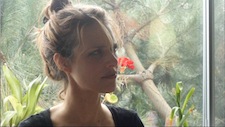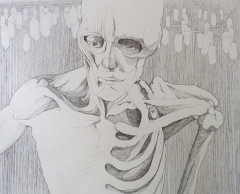Editorials Yasi Naraghi — February 26, 2013 12:26 — 0 Comments
The Monarch Drinks With Lynn Shelton
Lynn Shelton, Seattle’s most well-known movie director, arrived proper to my image of her: cool, casual, Northwesterly in a good way.
It was the usual fare at Café Presse, a hum of chatter rising from its snug tables, the wait-staff congregating behind the bar or casually dropping off plates and libations. I had been reminding myself not to confuse Claire Denis with René Clair—not the persons, but the names. I feared an embarrassing slip of the tongue. In the previous week I’d been teaching René Clair’s Dadaist tryst at the University of Washington, and I had just read an interview in which Shelton cites Claire Denis’ late foray into filmmaking as an inspiration. Denis had confirmed for her that, although she was in her late-thirties, it was not too late to start making feature films. I brought up Claire Denis half way through our teas—hers peppermint, mine black—as a variant on the Woman Question. I wasn’t going to be another person asking what it’s like to be a female filmmaker in a male dominated industry; I was merely curious about how it felt to sit in a theatre and have the epiphany that it’s not too late.
And “epiphany†was the term Shelton used to describe that moment.
In 2003, Shelton attended a screening of Vendredi Soir—she was acutely aware of her French pronunciation—at which Denis was present. At that time, Denis was 55 years old; she had made her first film, Chocolat, in 1988. After doing some “very quick math†in her head, as Shelton noted, while she was sitting in the theatre, she calculated that Denis was 40 years old at the time of Chocolat. This gave her three years to make her first film. She did exactly that, writing and directing her first feature, We Go Way Back, released in 2006.
As our conversation over tea progressed, the Woman Question proved itself inevitable. Shelton’s most recent film, Touchy Feely, was a nominee at this year’s Sundance Film Festival in the U.S. Drama Competition. For the first time in the history of the festival there were as many female as male filmakers represented in this category. Though it was a point of pride for her, Shelton didn’t dwell on the issue. She was more interested in talking about the film itself.
Touchy Feely seems to be a departure from her previous work, due to its multiple storylines, locations, and bigger cast. But Shelton explained that the experience was similar to her first film in terms of production: “I was ready for it,†she said, pointing to her return to scripted dialogue. There shouldn’t be any confusion, though, about the narrative structures of her feature films. Shelton has always been narratively precise, even in Humpday and Your Sister’s Sister, where experimentation and improvisation dominated the dialogue.
It was her bent for improvisation that led our conversation to the TV show, Mad Men. I asked if she knew specifically why she’d been hired for the job. “Matt [Weiner] had seen Humpday and liked the intimacy of the characters,†she told me, sipping her tea. In terms of visual aesthetics, however, the TV show and her film are quite different. Mad Men is meticulously designed to hyperbolize a decade, and there are no such hyperboles in Humpday, just the intimacy of the characters. But Shelton explained that beneath the sets and costumes of Mad Men lie characters that are every bit as raw and sincere as those in Humpday.
I wondered out loud about how a grassroots type of filmmaker might have felt stepping onto a Hollywood soundstage. Undoubtedly comfortable, I thought, immediately wishing I hadn’t asked the question. Shelton, though, always respectful, answered affably and with a steady voice. It’s hard to imagine her wavering. Ultimately, she likened directing an episode of a TV show to helping friends in realizing their artistic vision. It seemed a brazen, almost silly thing to say, but the comment speaks to her easy confidence. I was allayed by the facility of her charm—she repeatedly reached out to touch my arm for emphasis.
The topic of soundstages came up again when I asked about disadvantages of the Seattle film community. She had previously alluded to the benefit of making films in Seattle: funding, eager talent, home-field advantage. “I really want to see a soundstage in Seattle,” she said, a sense of lament and frustration in her voice—and there should be; she has a convincing case. She referenced Portland and its capacity to host TV shows like Grimm and Leverage. It would be a thriving and sustainable move for Seattle to have the same attraction, she argued. She’s seen a lot of talented young people in the local film industry grow resentful without stable work, or worse, leave Seattle altogether.
It’s about this time that the waitress drops off the check—maybe it’s the end of her shift. But we don’t rush out; I still have a few more questions. What she’s reading—mostly short stories and biographies—or if she’s ever felt like a Peeping Tom, watching others for her characters. The latter was perhaps a strange question, but it ended the evening on a gratifying note. Shelton became her most expressive: she recounted observing a young man from her car, “I saw this guy standing at a bus stop with his headphones on… he had a grocery tray of sushi and he was slowly putting the pieces in his mouth while listening to his music. He was just… he was just having this sublime moment.â€
While she spoke, she imitated the gestures of her subject with precise felicity. She had catalogued the moment, waiting for the right actor to portray it in one of her films. “Then I met Rosemarie DeWitt’s husband, Ron [Livingston]. At first I thought he would be—†she gesticulated with a minimalism that intimated rigidity, “but he wasn’t like that at all.†Livingston was cast in Touchy Feely with the man at the bus stop in mind.
Outside Presse, she asked if I needed a ride anywhere. I politely declined. I enjoy riding the bus, I said to her, I get my reading done. She chuckled, “I like that.†And we parted ways.
The answer isn't poetry, but rather language
- Richard Kenney




